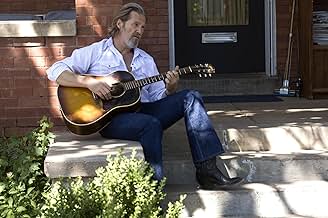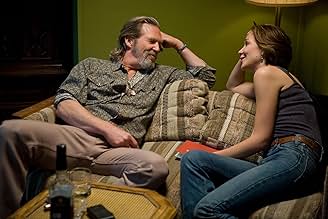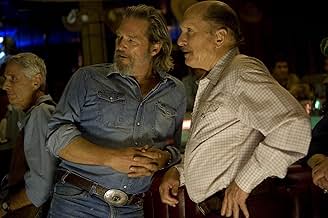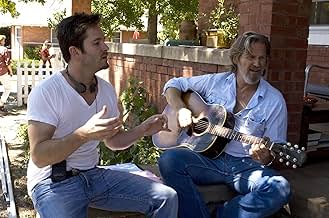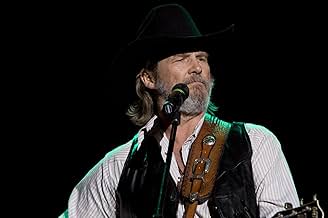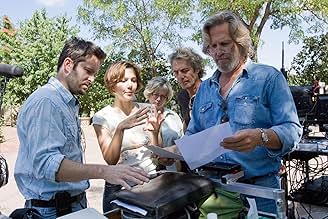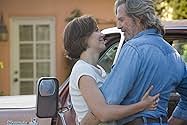Ein ausgeblichener Country-Musiker ist gezwungen, sein dysfunktionales Leben während einer zum Scheitern verurteilten Romanze zu überdenken, die ihn ebenfalls inspiriert.Ein ausgeblichener Country-Musiker ist gezwungen, sein dysfunktionales Leben während einer zum Scheitern verurteilten Romanze zu überdenken, die ihn ebenfalls inspiriert.Ein ausgeblichener Country-Musiker ist gezwungen, sein dysfunktionales Leben während einer zum Scheitern verurteilten Romanze zu überdenken, die ihn ebenfalls inspiriert.
- Regie
- Drehbuch
- Hauptbesetzung
- 2 Oscars gewonnen
- 40 Gewinne & 33 Nominierungen insgesamt
Jerry Handy
- Cowboy
- (as Jerry Hardy)
J. Michael Oliva
- Bear
- (as J. Michael 'Yak' Oliva)
Jose Jacinto Marquez
- Older Hispanic Man
- (as Jose Marquez)
Empfohlene Bewertungen
This is a sweet and believable film about real people. The story is anything but original, and yet it is done very nicely, with kind, genuine performances and a majestic Jeff Bridges. One very good move is that the director and screenwriter put most of the exaggeration and cliches at the beginning of the movie in order for us to "get' the characters. In doing so, the movie got more interesting and realistic as it went on.
'Crazy Heart' is a simple but emotionally resonant movie about a 57-year-old alcoholic country singer whose career is on the skids. There's not much to the story, but not much is necessary with Jeff Bridges as the singer, Bad Blake; Colin Farrell as Tommy Sweet, his handsome acolyte, now a big country music star; Maggie Gyllenhaal as Jean Craddock, a small-time New Mexico journalist with a four-year-old boy who has lousy luck with men, and falls for Bad; and Robert Duvall as Wayne, the singer's clean-and-sober bartender-protector.
Bridges, Gyllenhaal and Farrell have never been better, and Duvall is always pure gold. This movie is Bridges' chance to give a master class in acting, and he does not disappoint for a minute, but he's not alone in the spotlight, and the depth of support he gets is what makes Crazy Heart worth watching.
A lifelong musician and many-talented artist (painting, photography, ceramics) whose thespian preeminence in Hollywood has yet to win him an Oscar, Jeff Bridges inhabits the songs he sings on screen as convincingly and seamlessly as he fits into the shambles of a life and mess of a body that is the film's protagonist. This musical integrity is important because Bad Blake is one of those disintegrating performers whose art has not faltered, though his life has. The songs he sings are his own, and when he's on stage, he's alive. The rest of the time he's lying, deceiving, or numbing out. A great line is when he's asked by Jean where his songs come from and he replies simply, "Life, unfortunately."
A parallel to Bridges' work in 'Crazy Heart' is the similarly lived-in and authentic performance as a waning dance hall singer by Gérard Depardieu in Xavier Giannoli's 'The Singer'/'Quand j'étais chanteur,' a richly atmospheric little film released but barely seen in the US. But the milieu here is very different, and as American as 'The Singer's' is French. First time director Scott Cooper has said this movie tells "Merle Haggard's' story and Kris Kristofferson's and Waylon Jennings'. As Bad Blake, Jeff moves like Waylon, he has Merle Haggard's songwriting ability and Kris Kristofferson's charisma." Of course Bridges looks a lot like Kristofferson, and Bad Blake puts his hard times into his felt, authentic compositions as Waylon and Merle did. The songs are composed by T Bone Burnett, and are fine; more authenticity is added through other songs such as Townes Van Zandt's "If I Needed You" and Waylon Jennings' "Are You Sure Hank Done It This Way." Burnett composed the songs with the late Stephen Bruton; and the closing ballad, "The Losing Kind," with Ryan Bingham. Farrell as well as Bridges does his own singing, and his Irishness merges fairly convincingly into a slick country style. Just as Bad Blake is the mentor of Tommy Sweet, in real life Robert Duvall has become a mentor of the actor-writer-director, so his presence anchors the film and presides over it. Bridges knew of the movie but held off from committing to it till he learned his friend Burnett was in, so this is project that must have felt right, ultimately, for all concerned.
Bridges' Bad Blake is so authentically blousy and pathetic he's hard to look at sometimes. He's always drunk and at an opening gig at a Pueblo, Coloradi bowling rink, throws up in a back alley between songs, while the young pickup band he's saddled with has to fill in. In Santa Fe Jean shows up to do an interview, and a May-December romance develops as Bad woos Jean against her better judgment and plies her little boy with homemade pancakes (the boy is hungry for a man in his life and Bad oozes charm, when he's conscious). Gyllenhaal, who played a character struggling with addiction and recovery herself in 'SherryBaby,' gives a performance as a women warring inside with loneliness and need. Her scenes with Bridges are central to the movie, and the chemistry is strong between them.
Blake hasn't written songs for some years, but when he meets up with Tommy prior to a date opening for him to an audience of 12,00 in Denver, Tommy begs him to write some for him. In this way the screenplay manages to steer a course, perhaps a bit too easily, between success and failure. Clearly Bad Blake is still working, even if it's at lousy venues, and to prove it he's always on the phone to a hard-nosed Manager (James Keane) who's finding him the best gigs he can. This eventually leads to a contract to compose songs for an album with Tommy.
'Crazy Heart,' which was written by Cooper from the eponymous novel by Thomas Cobb, is perhaps a bit schematic about the up-down-up trajectory of the talented loser, but it manages to be pretty realistic about the degeneration that is terminal alcoholism. Here, however, it's not a slide into hell like Mike Figgis' Leaving Las Vegas. Though only by the skin of his teeth, and with multiple ailments a car crash reveals, Bad is surviving. So when the moment comes and he hits his bottom, he still has the strength to straighten out. Maybe the fast-forward finale is a bit too upbeat, but the memory the movie leaves is, of course, of Bridges with a bottle, a guitar, and a sad sweet song, and of some of the year's best movie acting.
Bridges, Gyllenhaal and Farrell have never been better, and Duvall is always pure gold. This movie is Bridges' chance to give a master class in acting, and he does not disappoint for a minute, but he's not alone in the spotlight, and the depth of support he gets is what makes Crazy Heart worth watching.
A lifelong musician and many-talented artist (painting, photography, ceramics) whose thespian preeminence in Hollywood has yet to win him an Oscar, Jeff Bridges inhabits the songs he sings on screen as convincingly and seamlessly as he fits into the shambles of a life and mess of a body that is the film's protagonist. This musical integrity is important because Bad Blake is one of those disintegrating performers whose art has not faltered, though his life has. The songs he sings are his own, and when he's on stage, he's alive. The rest of the time he's lying, deceiving, or numbing out. A great line is when he's asked by Jean where his songs come from and he replies simply, "Life, unfortunately."
A parallel to Bridges' work in 'Crazy Heart' is the similarly lived-in and authentic performance as a waning dance hall singer by Gérard Depardieu in Xavier Giannoli's 'The Singer'/'Quand j'étais chanteur,' a richly atmospheric little film released but barely seen in the US. But the milieu here is very different, and as American as 'The Singer's' is French. First time director Scott Cooper has said this movie tells "Merle Haggard's' story and Kris Kristofferson's and Waylon Jennings'. As Bad Blake, Jeff moves like Waylon, he has Merle Haggard's songwriting ability and Kris Kristofferson's charisma." Of course Bridges looks a lot like Kristofferson, and Bad Blake puts his hard times into his felt, authentic compositions as Waylon and Merle did. The songs are composed by T Bone Burnett, and are fine; more authenticity is added through other songs such as Townes Van Zandt's "If I Needed You" and Waylon Jennings' "Are You Sure Hank Done It This Way." Burnett composed the songs with the late Stephen Bruton; and the closing ballad, "The Losing Kind," with Ryan Bingham. Farrell as well as Bridges does his own singing, and his Irishness merges fairly convincingly into a slick country style. Just as Bad Blake is the mentor of Tommy Sweet, in real life Robert Duvall has become a mentor of the actor-writer-director, so his presence anchors the film and presides over it. Bridges knew of the movie but held off from committing to it till he learned his friend Burnett was in, so this is project that must have felt right, ultimately, for all concerned.
Bridges' Bad Blake is so authentically blousy and pathetic he's hard to look at sometimes. He's always drunk and at an opening gig at a Pueblo, Coloradi bowling rink, throws up in a back alley between songs, while the young pickup band he's saddled with has to fill in. In Santa Fe Jean shows up to do an interview, and a May-December romance develops as Bad woos Jean against her better judgment and plies her little boy with homemade pancakes (the boy is hungry for a man in his life and Bad oozes charm, when he's conscious). Gyllenhaal, who played a character struggling with addiction and recovery herself in 'SherryBaby,' gives a performance as a women warring inside with loneliness and need. Her scenes with Bridges are central to the movie, and the chemistry is strong between them.
Blake hasn't written songs for some years, but when he meets up with Tommy prior to a date opening for him to an audience of 12,00 in Denver, Tommy begs him to write some for him. In this way the screenplay manages to steer a course, perhaps a bit too easily, between success and failure. Clearly Bad Blake is still working, even if it's at lousy venues, and to prove it he's always on the phone to a hard-nosed Manager (James Keane) who's finding him the best gigs he can. This eventually leads to a contract to compose songs for an album with Tommy.
'Crazy Heart,' which was written by Cooper from the eponymous novel by Thomas Cobb, is perhaps a bit schematic about the up-down-up trajectory of the talented loser, but it manages to be pretty realistic about the degeneration that is terminal alcoholism. Here, however, it's not a slide into hell like Mike Figgis' Leaving Las Vegas. Though only by the skin of his teeth, and with multiple ailments a car crash reveals, Bad is surviving. So when the moment comes and he hits his bottom, he still has the strength to straighten out. Maybe the fast-forward finale is a bit too upbeat, but the memory the movie leaves is, of course, of Bridges with a bottle, a guitar, and a sad sweet song, and of some of the year's best movie acting.
In his directorial debut, Scott Cooper adapts Thomas Cobb's Crazy Heart, the story of Bad Blake, a washed-up country star with an alcohol addiction. The film stars Jeff Bridges, in the lead role, and Maggie Gyllenhaal as Jean, a young reporter is taken in by Blake's heartache and pain.
Cooper's direction is of subtle greatness. The film is quiet, slow-paced, but works. It's never meant to be loud or over-the-top, which some may be expecting; it's a beautiful written song about life thrust into a two-hour sympathy riot. Bridges, who will surely receive Oscar attention, is reserved, charismatic, and raw. Bridges' 58-year-old Blake is one of the better performances of the year. There are obvious comparisons to Robert Duvall's performance Tender Mercies, with critics believing a possibly similarity to Mickey Rourke's work in The Wrestler, which is certainly not the case, this is unique in its own way. Bridges doesn't overcook the role which would have been easy, he's effortless and sings quite well.
Maggie Gyllenhaal, Oscar snubbed for her works in Sherrybaby and World Trade Center, is nearly average in her work. She's coy with Jean and underplays her, but unlike Bad Blake, her role doesn't call for it. Jean is a bruised, kindhearted, and devoted mother to her four-year old son Buddy (Jack Nation, as cute as can be), but uneven in narrative forming.
Robert Duvall is brief, and nearly ineffectual. As the bar owner Wayne, he offers a humanity for Blake outside of woman, which is needed in the film, but in the end is unmemorable. Also sharing this boat is the talented Colin Farrell, who's both likable and adequate, but upstaged by scenes with Bridges.
The only thing more beautiful than Bridges' performance is the song "The Weary Kind," which is submission for Best Original Song for the Academy Awards. This is one of the best songs written for a film in the last ten years. Delightful lyrics and exquisitely executed, the song one of the rare occasions of the perfect song for a perfect film, given the film's nature.
While Crazy Heart doesn't offer anything insightful to the realm of cinema, it's simple, uncomplicated, and honest, which you can't appreciate. For a first time out, Cooper does an admirable job.
***/****
Cooper's direction is of subtle greatness. The film is quiet, slow-paced, but works. It's never meant to be loud or over-the-top, which some may be expecting; it's a beautiful written song about life thrust into a two-hour sympathy riot. Bridges, who will surely receive Oscar attention, is reserved, charismatic, and raw. Bridges' 58-year-old Blake is one of the better performances of the year. There are obvious comparisons to Robert Duvall's performance Tender Mercies, with critics believing a possibly similarity to Mickey Rourke's work in The Wrestler, which is certainly not the case, this is unique in its own way. Bridges doesn't overcook the role which would have been easy, he's effortless and sings quite well.
Maggie Gyllenhaal, Oscar snubbed for her works in Sherrybaby and World Trade Center, is nearly average in her work. She's coy with Jean and underplays her, but unlike Bad Blake, her role doesn't call for it. Jean is a bruised, kindhearted, and devoted mother to her four-year old son Buddy (Jack Nation, as cute as can be), but uneven in narrative forming.
Robert Duvall is brief, and nearly ineffectual. As the bar owner Wayne, he offers a humanity for Blake outside of woman, which is needed in the film, but in the end is unmemorable. Also sharing this boat is the talented Colin Farrell, who's both likable and adequate, but upstaged by scenes with Bridges.
The only thing more beautiful than Bridges' performance is the song "The Weary Kind," which is submission for Best Original Song for the Academy Awards. This is one of the best songs written for a film in the last ten years. Delightful lyrics and exquisitely executed, the song one of the rare occasions of the perfect song for a perfect film, given the film's nature.
While Crazy Heart doesn't offer anything insightful to the realm of cinema, it's simple, uncomplicated, and honest, which you can't appreciate. For a first time out, Cooper does an admirable job.
***/****
Saw an early screening of "Crazy Heart". "Crazy Heart" is a very good film for one reason. Many critics have praised it and will continue to do so. Many critics will write it off as "just another washed-up musician struggling to overcome their addictions and weaknesses and make sense of things", etc. In a way, they are right. In a way, this is another one of those movies. But, because of Jeff Bridges' absolutely amazing performance, this film is more than that. If you want to see an actor breathe real-life into their character, endow truthful subtlety in their part, and absolutely nail a role that they were born to play, then you need to see Jeff Bridges rendition of Bad Blake. I believed that Bridge's portrayal of "The Dude" in "The Big Lebowski" was the essential role of his career, but after seeing this performance, I've changed my tune. It's true that we will not be witnessing cinematic history with the incredible plot or awe-inspiring film-making. However, if you are a fan of acting and want to see one of those performances that comes along every once in a rare while, please check out this film.
"Petition me no petitions, sir, to-day; Let other hours be set apart for business. To-day it is our pleasure to be drunk . . ." Henry Fielding, Tom Thumb, The Great
When a memorable performance transcends a mediocre plot, the result is a memorable role flanked by a forgettable film. Such is the case of Jeff Bridges as Bad Blake, a sodden wreck of a country singer still making a living playing at bars and bowling alleys in Crazy Heart, an apt title.
Not Garth Brooks or Willie Nelson, but well-known enough to be offered free booze and free ladies, 57 year old Bad is like his 30 year old pickup truck, still serviceable but ready to bust at any moment. Bridges is a believable singer/drunk, not overdoing either but pathetic enough for you to want to strangle some sense into him while he still can perform. And write songs—if he can get to them, especially at the encouragement of Tommy Sweet (a convincing, real life bad boy Colin Farrell), young country singer now flourishing partly because of Bad's good mentoring. The descent into cliché is quick as Santa Fe reporter Jane (Maggie Gyllenhaal) falls for him during an interview for her paper. She has a four-year old child—well, you can guess the rest of the film through romance and rehab but maybe not denouement.
The addition of one of the producers of the film, Robert Duvall, as Bad's friend and club owner Wayne, is a welcome allusion to Duvall's Oscar performance as country singer Mac Sledge in Tender Mercies. Add T Bone Burnett as a song writer and producer of the film and you have a promising pedigree. Unfortunately director/writer Scott Cooper may not have caught the fire of the original novel by Thomas Cobb.
I will nominate Bridges as one of the best actors of the year. That's the best I can offer you besides the New Mexico landscape and cloud dotted blue sky. As for watching another story about an alcoholic singer, I'll stick with Colin Firth drinking a little in A Single Man or Michael Sheen in the Damned United. The drunken hero is one of my damned.
When a memorable performance transcends a mediocre plot, the result is a memorable role flanked by a forgettable film. Such is the case of Jeff Bridges as Bad Blake, a sodden wreck of a country singer still making a living playing at bars and bowling alleys in Crazy Heart, an apt title.
Not Garth Brooks or Willie Nelson, but well-known enough to be offered free booze and free ladies, 57 year old Bad is like his 30 year old pickup truck, still serviceable but ready to bust at any moment. Bridges is a believable singer/drunk, not overdoing either but pathetic enough for you to want to strangle some sense into him while he still can perform. And write songs—if he can get to them, especially at the encouragement of Tommy Sweet (a convincing, real life bad boy Colin Farrell), young country singer now flourishing partly because of Bad's good mentoring. The descent into cliché is quick as Santa Fe reporter Jane (Maggie Gyllenhaal) falls for him during an interview for her paper. She has a four-year old child—well, you can guess the rest of the film through romance and rehab but maybe not denouement.
The addition of one of the producers of the film, Robert Duvall, as Bad's friend and club owner Wayne, is a welcome allusion to Duvall's Oscar performance as country singer Mac Sledge in Tender Mercies. Add T Bone Burnett as a song writer and producer of the film and you have a promising pedigree. Unfortunately director/writer Scott Cooper may not have caught the fire of the original novel by Thomas Cobb.
I will nominate Bridges as one of the best actors of the year. That's the best I can offer you besides the New Mexico landscape and cloud dotted blue sky. As for watching another story about an alcoholic singer, I'll stick with Colin Firth drinking a little in A Single Man or Michael Sheen in the Damned United. The drunken hero is one of my damned.
Wusstest du schon
- WissenswertesJeff Bridges and Colin Farrell did their own singing in this film, with the assistance of voice coach Roger Love.
- PatzerThe first time Bad leaves Jean's house, the left front fender of the Suburban says "Silverado", the second time he leaves Jean's house, after the roll over, it says "Scottsdale" which means they used at least two trucks.
- VerbindungenFeatured in The Rotten Tomatoes Show: 2012/The Messenger/Fantastic Mr. Fox (2009)
- SoundtracksHold On You
(2009)
Written by Stephen Bruton, T Bone Burnett, John Goodwin, and Bob Neuwirth
Performed by Jeff Bridges
Top-Auswahl
Melde dich zum Bewerten an und greife auf die Watchlist für personalisierte Empfehlungen zu.
Details
- Erscheinungsdatum
- Herkunftsland
- Offizielle Standorte
- Sprachen
- Auch bekannt als
- Loco corazón
- Drehorte
- Hard Rock Pavilion - 5601 University Blvd SE, Albuquerque, New Mexico, USA(Bad opens for Tommy Sweet here at the Journal Pavilion.)
- Produktionsfirmen
- Weitere beteiligte Unternehmen bei IMDbPro anzeigen
Box Office
- Budget
- 7.000.000 $ (geschätzt)
- Bruttoertrag in den USA und Kanada
- 39.464.306 $
- Eröffnungswochenende in den USA und in Kanada
- 82.664 $
- 20. Dez. 2009
- Weltweiter Bruttoertrag
- 47.405.566 $
- Laufzeit1 Stunde 52 Minuten
- Farbe
- Sound-Mix
- Seitenverhältnis
- 2.35 : 1
Zu dieser Seite beitragen
Bearbeitung vorschlagen oder fehlenden Inhalt hinzufügen








